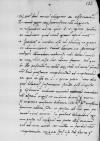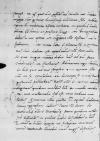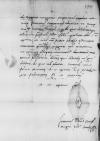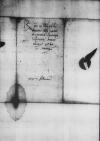Paucis cogor atque laconismo non eleganti et respondere ad ea, quae Dominatio Vestra Reverendissima ⌊⌋, et indicare, quid rerum geratur apud nos. Dominus ⌊Ioannes a Verden⌋ est mihi plurimum et gratus et commendatus. Cuius honori et fortunis numquam commodare intermisi, ubi dabatur occasio et neque nunc cesso hoc idem facere. Sed quae de illo paerferuntur in aulam atque etiam ad aures principum, non leve praestant impedimentum ad impetrandum ea, quae et ipse et Dominatio Vestra Reverendissima petit. Inter alia, quae delatores susurrant, ferunt eum dixisse, quod ⌊Gedanenses⌋ cudunt monetam mandatis non obstantes regiis, et cudent deinc[eps] etiam si manus conserere debeant, et r[eli]qua eiusdem farinae addita sunt et forsan ab iis, qui putantur eius amici. In quibus diluendis ego me praesto non vulgarem, ut puto, illius amicum. Sed ad rem accedo. De villa in feudum nunc impetranda exigua spes est. Nam praeterea quae
scripsi, ea quoque, quae hic aguntur non sinunt, ut ⌊maiestas regia⌋ hoc genere beneficii devinciat sibi subditos. Spero tamen reditura tempora mitiora, in quibus licebit principi, quod licuit et profuit semper. De burgrabiatu dabitur a me opera, ut ingratus ille deferatur ad dominum ⌊Ioannem⌋.
De mota lite ⌊domini Plotowski⌋ a ⌊Quirino⌋ res hic habita est apud omnes non ferenda, de qua ⌊regia maiestas⌋ dedit litteras ad ⌊summum pontificem⌋ cardinales et ⌊Fuckaros⌋. Admonui ego ⌊hominem⌋ de his, quae ad me scripsit Dominatio Vestra Reverendissima. ⌊Ille⌋ vero et se excusabat et deinceps se modestius gesturum pollicebatur. ⌊Quem⌋ Vestrae Dominationi Reverendissimae commendo. Agitatur quidem interdum bili et morbo cardiaco aut melancholiae, sed est, meo iudicio, vir bonus.
⌊Comitia⌋ nostra quem sint exitum habitura, brevi cognoscere dabitur. Nam nondum de articulis omnibus concordavimus, pauci quidem restant, sed difficiles, in quibus hodie desudabitur a nobis. Petitur a ⌊maiestate regia⌋, ut suscipiat munus iterum tractandae concordiae inter reges dissidentes
de ⌊regno Ungariae⌋. Proponitur modus, ut rex ⌊Ioannes⌋ ⌊Cracoviam⌋ veniat et ⌊rex Romanorum⌋ ⌊Wratislaviam⌋, super quo deliberatur. Alia in praesens non sunt.
Feliciter valeat Dominatio Vestra Reverendissima, et me non putet pluris aestimare munera quantumlibet magna, quam amorem, et animus obsequii memorem eorum praesertim hominum, qui virtutibus insignes habentur, de quo non plura. Commendo me fraterno amori Dominationis Vestrae Reverendissimae.



